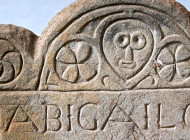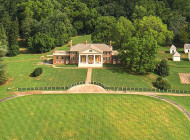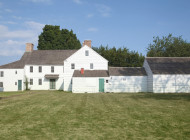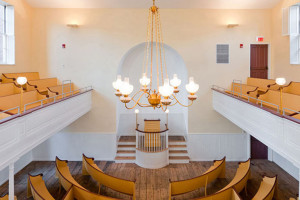
A view from the balcony inside the African Meeting House, where ironically, its black members had to sit during the public dedication on December 6, 1806, while the floor pews were saved for those “benevolently disposed to the Africans.”
By Andrea Valluzzo
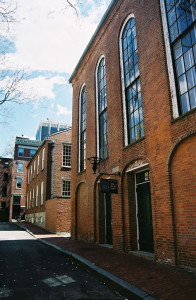
The African Meeting House was built in 1806 with almost entirely black labor and was known in the greater community as the Black Faneuil Hall. William Lloyd Garrison founded the New England Anti-Slavery Society here in 1832.
BOSTON, MASS. — Owing to its part in the American Revolution, Boston has many historic sites, but the two National Historic Landmarks detailed here tell an important story not of the country’s bid to secure its independence but its African American citizens’ efforts to secure their unalienable rights, including the right to worship and pursue an education.
Between 1800 and 1900, nearly all of the African Americans who called the city home settled in the West End, between Pinckney and Cambridge Streets, and Joy and Charles Streets, a neighborhood now known as Beacon Hill’s North Slope.
The first Africans were brought to Boston in February 1638, less than ten years after Boston was founded. By 1705, records show a population of more than 400 enslaved Africans in the city with the beginnings of a free black community in the North End.
The American Revolution was a watershed in the status of African people in Massachusetts and when the war was over, free black people outnumbered enslaved people in Boston. In the first federal census of 1790, Massachusetts was the only state in the Union to document no slaves.
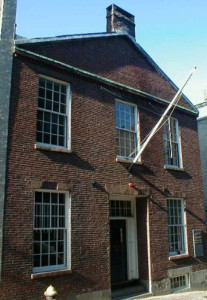
The Abiel Smith School was built in 1834 and dedicated the following year, replacing the Meeting House School and educated many African American children in Boston.
Located at 46 Joy Street, the African Meeting House and Abiel Smith School were built in the early 1800s and stand testament today to community organizing and black craftsmanship. Once a church, a school and vital community meeting place, the African Meeting House underwent a $9.5 million restoration that returned the building to its 1855 appearance. The Abiel Smith School has the distinction as the nation’s oldest public school for African American children. Both are open to the public and under management of the Museum of African American History.
The meeting house, the oldest black church building in the United States, was built in 1806 and hosted key people and events in the Abolitionist movement, such as the founding of the New England Anti-Slavery Society by William Lloyd Garrison in 1832; the 1833 farewell address of Maria Stewart, a black woman and the first American-born woman who spoke publicly before a mixed-gender audience; an 1860 anti-slavery speech by Frederick Douglass that he gave after being run out of Tremont Temple; and an 1863 recruitment to the 54th Massachusetts Regiment led by Colonel Robert Gould Shaw. Before 1805, black people in Boston could go to white churches but they were only allowed to sit in the balconies and not allowed to vote.
Thomas Paul, an African American minister, conducted religious services for blacks at Faneuil Hall. He and 20 of his associates officially formed the First African Baptist Church on August 8, 1805. In the same year, land was purchased for a building in the West End. The African Meeting House was finished a year later.
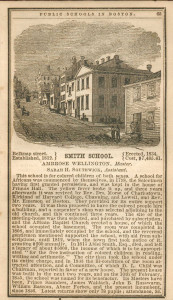
A page from the 1843 Boston Almanac shows a current student population at the Abiel Smith School of 78 students.
The building’s facade is taken from a townhouse design published by Boston architect Asher Benjamin. In addition to its religious and educational activities, the meeting house became a place for celebrations and political and anti-slavery meetings. By the end of the Nineteenth Century, the neighborhood saw a migration to the South End with a Jewish community taking over and the building was sold to become a synagogue. The Museum of African American History acquired it in 1972.
Abiel Smith School
Noted abolitionist Prince Hall petitioned the state lawmakers in 1787 for African American children’s right to attend public schools, it — and many more to come — would be rejected. Nearly a dozen years later, African American parents opened a community school in the home of Primus Hall, Prince’s son. Later renamed and moved to the meeting house, the Abiel Smith School, which was expressly built to educate black children, was named after a white businessman who gave a $2,000 endowment to the city of Boston to educate black children.
After desegregation, African American children were at last allowed to attend the public schools nearest to their homes in 1855 and the Smith school closed. It was later the headquarters for black Civil War veterans and today is a historic site with exhibit galleries that is open to the public year round.
Both sites are on the Black Heritage Trail (www.afroammuseum.org/trail.htm), guided tours and self-guided walking tours are available. For more information, 617-725-0022, ext 22.

